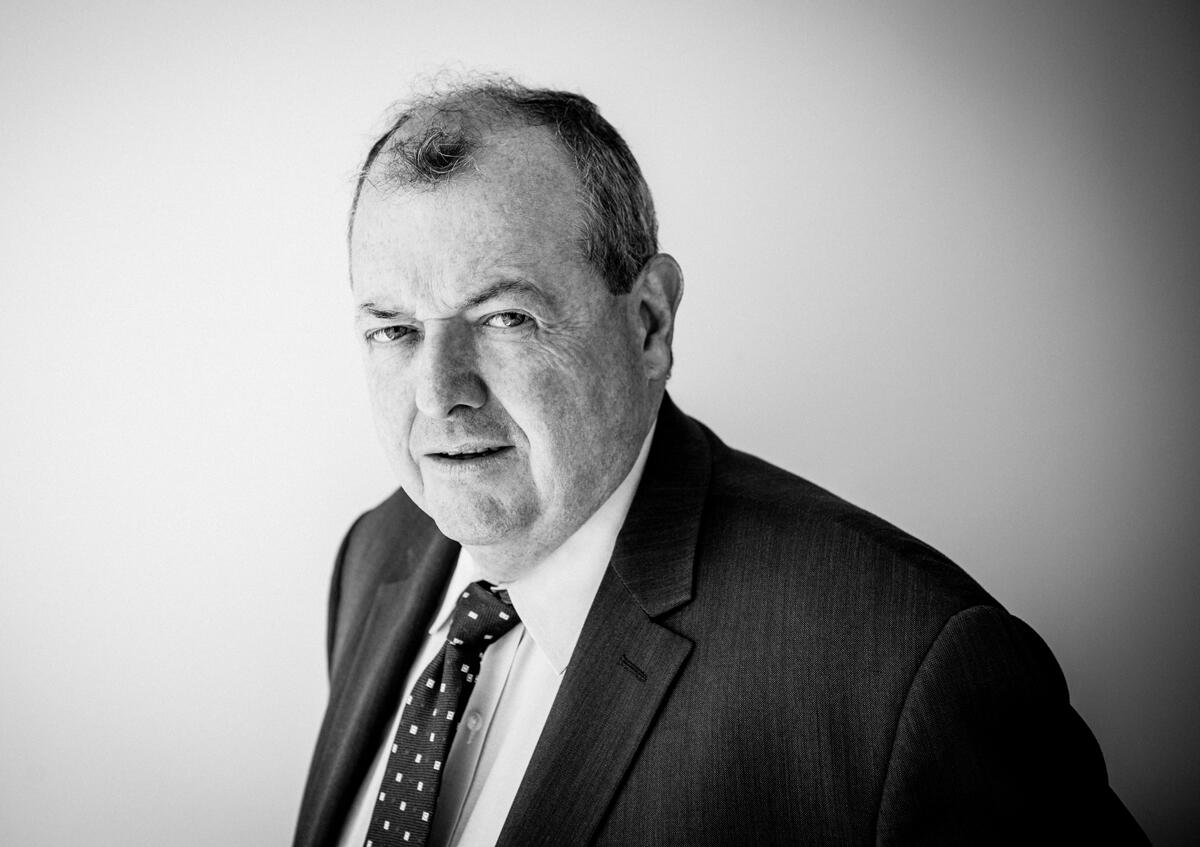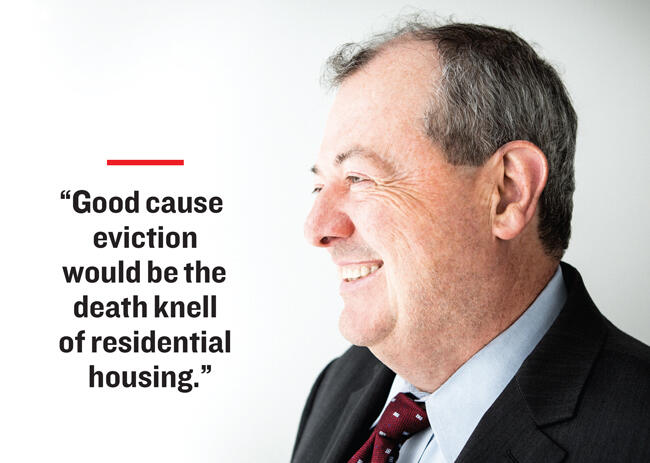At the Real Estate Board of New York’s annual gala in June, Jim Whelan held court. As some of the industry’s biggest developers and dealmakers shook his hand or slapped him on the back, one elected official joked that he had come over to “kiss the ring.”
Whelan rose to head the industry trade group after nearly a decade working for it, during which he was instrumental in the organization’s efforts to renew the lucrative 421a property tax break (which recently lapsed again) and helped broker a deal between feuding labor leaders and developers at Hudson Yards.
He got his start in city government as an intern with the Environmental Control Board, helping the agency figure out how to collect unpaid fines. After stints with the 14th Street-Union Square Business Improvement District, the Manhattan borough president’s office and the Brooklyn Chamber of Commerce, he went on to lead the Downtown Brooklyn Council, where he advocated a rezoning that would transform the neighborhood.
In 2003, Dan Doctoroff, deputy mayor of economic development under Mayor Michael Bloomberg, tapped Whelan to steer the Hudson Yards Coalition, where he pushed for the sweeping zoning changes that helped pave the way for the megadevelopment.
Now, as Whelan enters his third year overseeing the most powerful real estate advocacy group in one of the world’s most vital real estate markets, his job is perhaps more complicated than ever before.
“At the state level, we were tracking over 1,652 pieces of legislation this year,” he said. “It’s kind of staggering. The last nine months have really been somewhat of a very intense meat grinder.”
The Real Deal sat down with Whelan to learn more about his upbringing, his career and his vision for the city’s uncertain future.
This interview has been edited and condensed for clarity.
Born: December 3, 1963
Hometown: Elmhurst, Queens
Lives: Bellerose, Queens
Family: Married, two children
What were you like as a kid?
I’m first-generation. My parents are Irish immigrants. My father got a nursing degree in England, and he was a registered nurse. My mom did various jobs. They didn’t know how to drive. I taught my mother how to drive at the age of 60, so we didn’t have a car. Me and my three sisters got to know the subway system pretty well.
How would you describe the sibling dynamic?
In an Irish Catholic family, being the boy, not bad. I kid my youngest sister, because really, she got away with everything. But when the first two do really well, when it gets to the third and fourth, you basically could do whatever you want. So it was a pretty good gig from that perspective. But we stayed pretty tight. We see each other on holidays. We were very involved in caring for my parents later on in their years. And when they passed, it sort of brought us together.
You went to law school. Why didn’t you stick with being a lawyer?
I wasn’t particularly interested in being a lawyer. Rob Walsh was running the 14th Street Union Square BID at the time, and he brought me on to be his No. 2. We got involved in a lot of difficult community situations. Rezoned the south side of 14th Street. There was an infamous building at the time called the Sahara Hotel [at 201 East 14th Street], and we basically forced the owner to sell it.
There was an armory on 14th Street that [Mayor] Rudy Giuliani was looking to use as a workfare processing center. And we worked with community leaders. Today, it’s a YMCA and it’s an NYU dorm. Rob left and I wasn’t interested in the job, the No. 1 job. I suffered from depression and anxiety, but I ended up running the job for nine months, and I secured the initial funding to begin the expansion at Union Square Park.
What did you like about the work that you were doing?
I like seeing change and seeing improvement. I do feel proud of what has transpired in Downtown Brooklyn when you consider what Downtown Brooklyn was in 1998. A lot of folks weren’t optimistic about the future. I just met with a lot of people. One of my skills in life is I’m a good listener, and I like to surround myself with smart people. I don’t think I’m the smartest guy in the room. I listened to these people and thought through what was really needed for the future. To go there now nearly 20 years later, and to see that change that was effectuated, I think it’s good for the city.
What were some of the challenges to getting officials on board with Hudson Yards?
I sort of ran the Hudson Yards Coalition, which was an effort to build a constituency behind the West Side plan. It was the expansion of Javits. It was the rezoning of the area. It was the extension of the 7 train. And it was the construction of the New York Sports and Convention Center [also known as the West Side Stadium].
I’d never done a job like that before. When I was doing the Downtown Brooklyn rezoning, I’d go meet with anybody. I’d take meetings in people’s kitchens. I was somewhat inexhaustible in that regard, but Hudson Yards, it was a much different project. Facets of it obviously were very controversial. I came to the realization that the biggest supporters would be organized labor, who I hadn’t really had many dealings with before, but developed those relationships, and I think built a very strong coalition. It was very helpful in pushing through the rezoning, but it didn’t get us over the finish line, obviously, on the New York Sports and Convention Center.
There were a number of elected officials at the REBNY gala this year. Is that a sign of shifting attitudes toward the industry? Do you think the Adams administration is partly responsible?
I think that might be part of it. The political winds may be changing a little bit. I have a very strong team here, and one of the things they are great at is reaching out and dealing with groups and elected officials of all stripes and ideologies. We try to be data-focused, policy-driven. I think that hard work is paying off in an attitude on the part of elected officials and public officials that this is an organization that we can deal with, that will give it to us straight and try to work things out.
Prior to becoming president, you had more of a behind-the-scenes role at REBNY. How have you handled that transition?
I still try to stay behind the scenes.
What’s the most surprising thing about your current job?
It’s not that I’ve been surprised. It’s a challenging job. At the state level, we were tracking over 1,652 pieces of legislation this year. It’s kind of staggering. The last nine months have really been somewhat of a very intense meat grinder from everything about the state agenda, to a new mayoral administration coming in, to the release of Citysnap, to the New York Forever event. Everybody’s sort of trying to take a deep breath now and get ready for the future.
The 421a tax break lapsed this year, despite the governor supporting a replacement program.
We knew that this wasn’t a conversation that should occur in June 2022, because it was just getting too close to the election. The closer it got to the election, the more likely the conversation was going to be politicized. So we thought it was important to get it done in the budget. The governor and legislative leaders couldn’t come to an agreement. One of the things we were struck by, and it wasn’t only us — 32BJ and the building trades picked up on this as well — it was a little challenging in conversations with legislators. It was, “No 421a, no 485w. Oh, but we’re not putting anything on the table.”
So what’s next?
Subsequent to the budget, we had some conversations with some of the legislative leaders. I know a bunch of people on the far left don’t want to acknowledge this, [but] the economics matter. The math matters. If the math doesn’t work, people aren’t going to build it. It’s not possible to just push the private sector aside and think you’re going to produce that level of housing through public action. I think if a consensus develops around this, it may get resolved sooner rather than later, but absent that consensus, this could be an ongoing issue for quite some time.
Do you see a future in which REBNY works with groups like Housing Justice for All or the DSA on this issue?
We’re pretty much willing to engage with anybody. [At] the Eviction Prevention Roundtable, we were at the table with Legal Aid Society. I think both groups would agree that concept was unimaginable several years ago. I met with senior legislative leaders in the last few weeks, before the end of the session, and 32BJ and the building trades were part of the meeting.
We’re willing to meet with anybody. Let’s have a candid conversation about what we’re trying to achieve. If we can work together, great, if we can’t, we’ll part company, and we still advocate against each other. We say we have a housing crisis, but we don’t really treat it like it’s a housing crisis because it’s not one answer that’s going to magically resolve our housing issue. We’re going to need to move on a variety of fronts to meaningfully move the needle to make it easier for folks to live in New York City.
Can good cause eviction be part of that solution?
At least 485w was in the governor’s budget. Good cause eviction was in nobody’s budget. Nobody put that issue on the table officially. So while I think it’s in the minds of some advocates, it didn’t reflect itself in any conversations with the legislative bodies or the governor. The good cause eviction bill would be the death knell of residential housing in New York City.
Was it important for you to raise your kids in Queens?
We really liked Carroll Gardens, and we had my daughter there. This was 2001. At that point, we could afford maybe half a brownstone that needed work. We ended up moving to Bellerose, Queens, which had several advantages. It put us 10 minutes between each set of grandparents. And that is District 26 in school district parlance, which is one of the best school districts, if not the best school district, in New York City. The downside is it takes me 75 minutes to get to work.
Do you have any favorite musical acts from Queens?
No. I’m a big Springsteen fan.
How did you meet your wife?
We went to grammar school together. It gets hokier after that. We started dating after a 15-year grammar school reunion. She said she got a few dates at that, but I took her to the circus. That was our first date. We went to the Big Apple Circus in Lincoln Center. And the rest is history.
Do you have any professional regrets?
I think I’ve mellowed somewhat since being in the top job — at least people have told me I’ve gotten more political, and they mean that as a compliment. I’ve had a history, or a reputation, of having sharp elbows. So I don’t think that has served me well at times.

